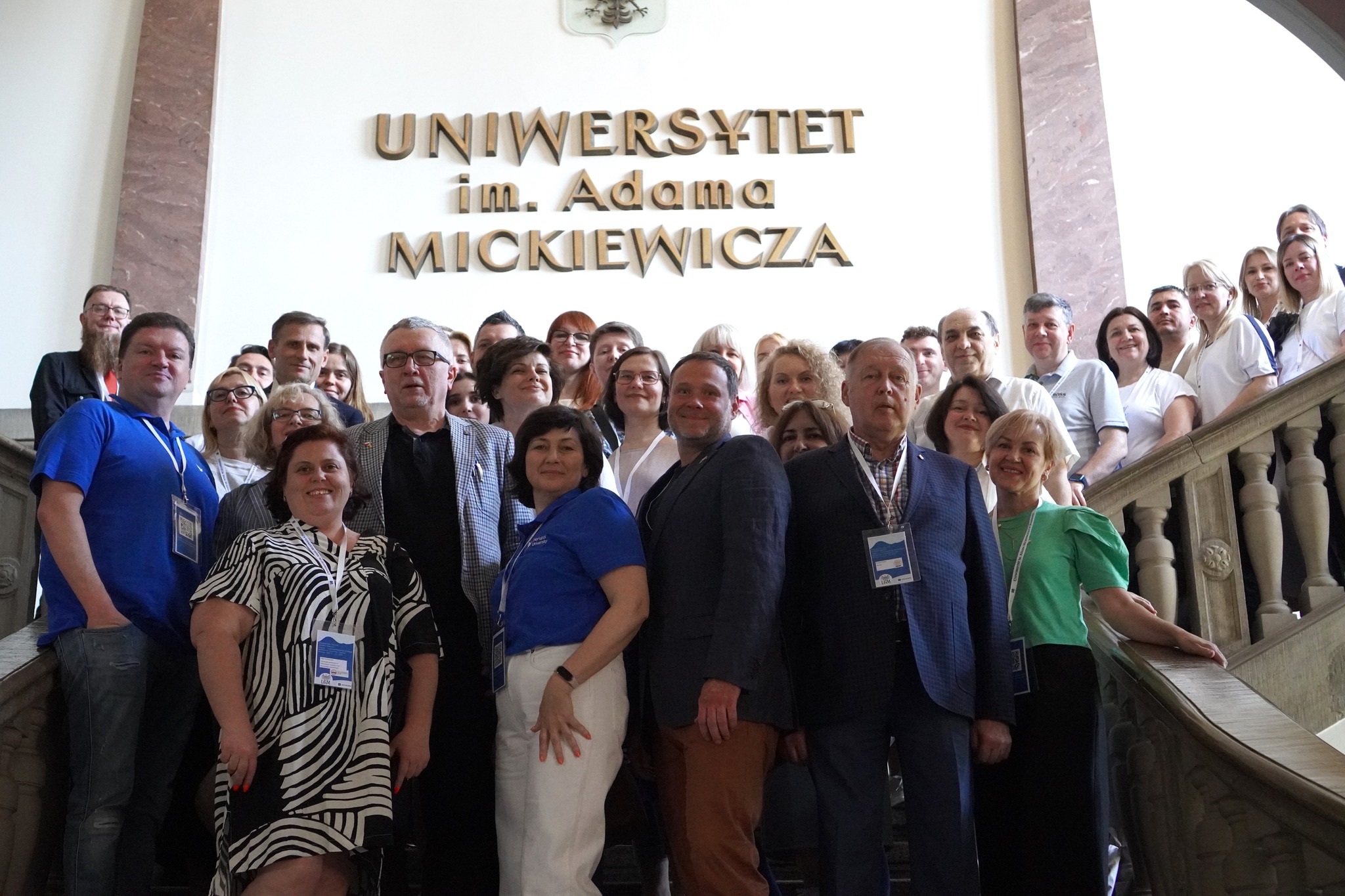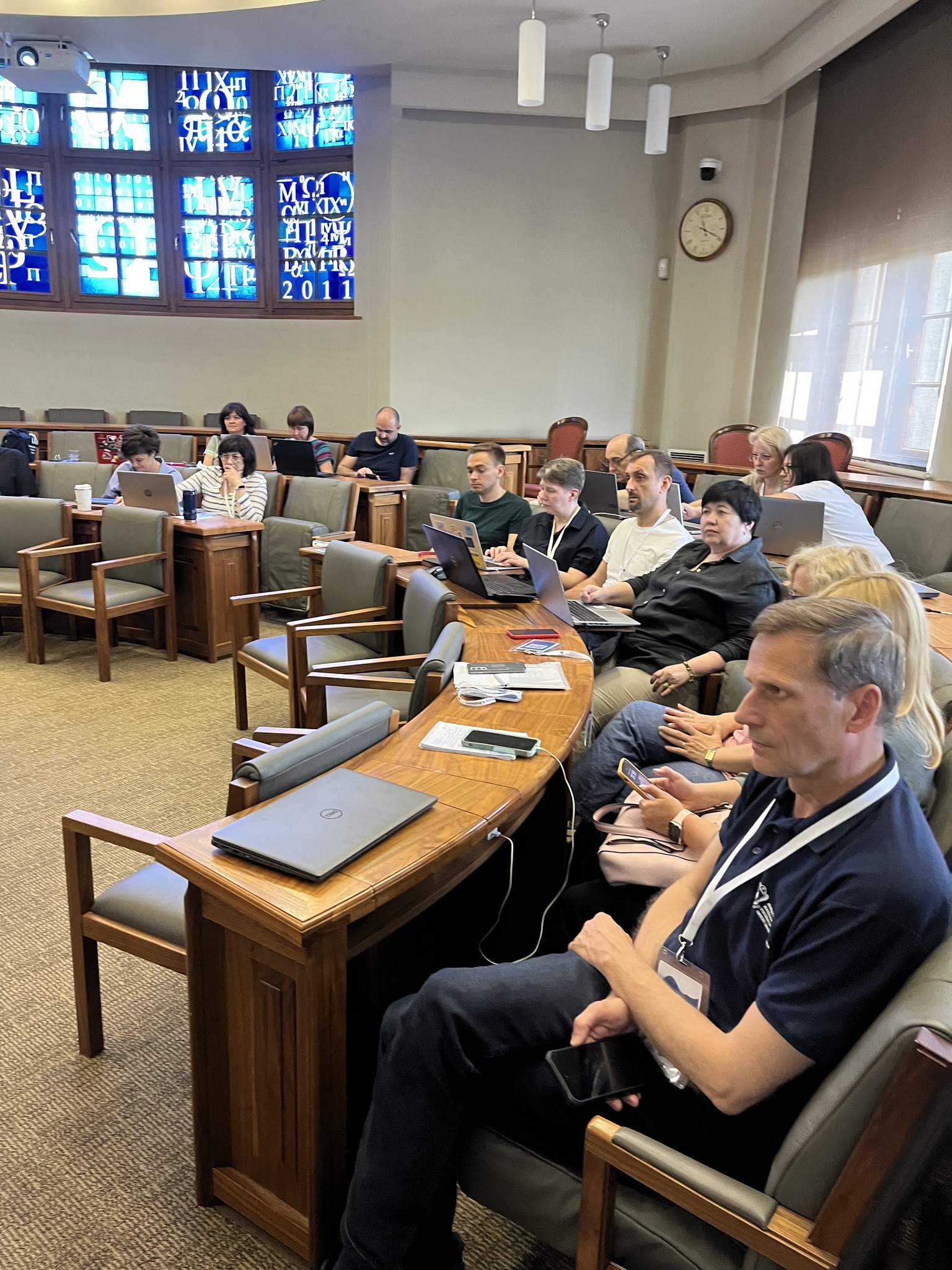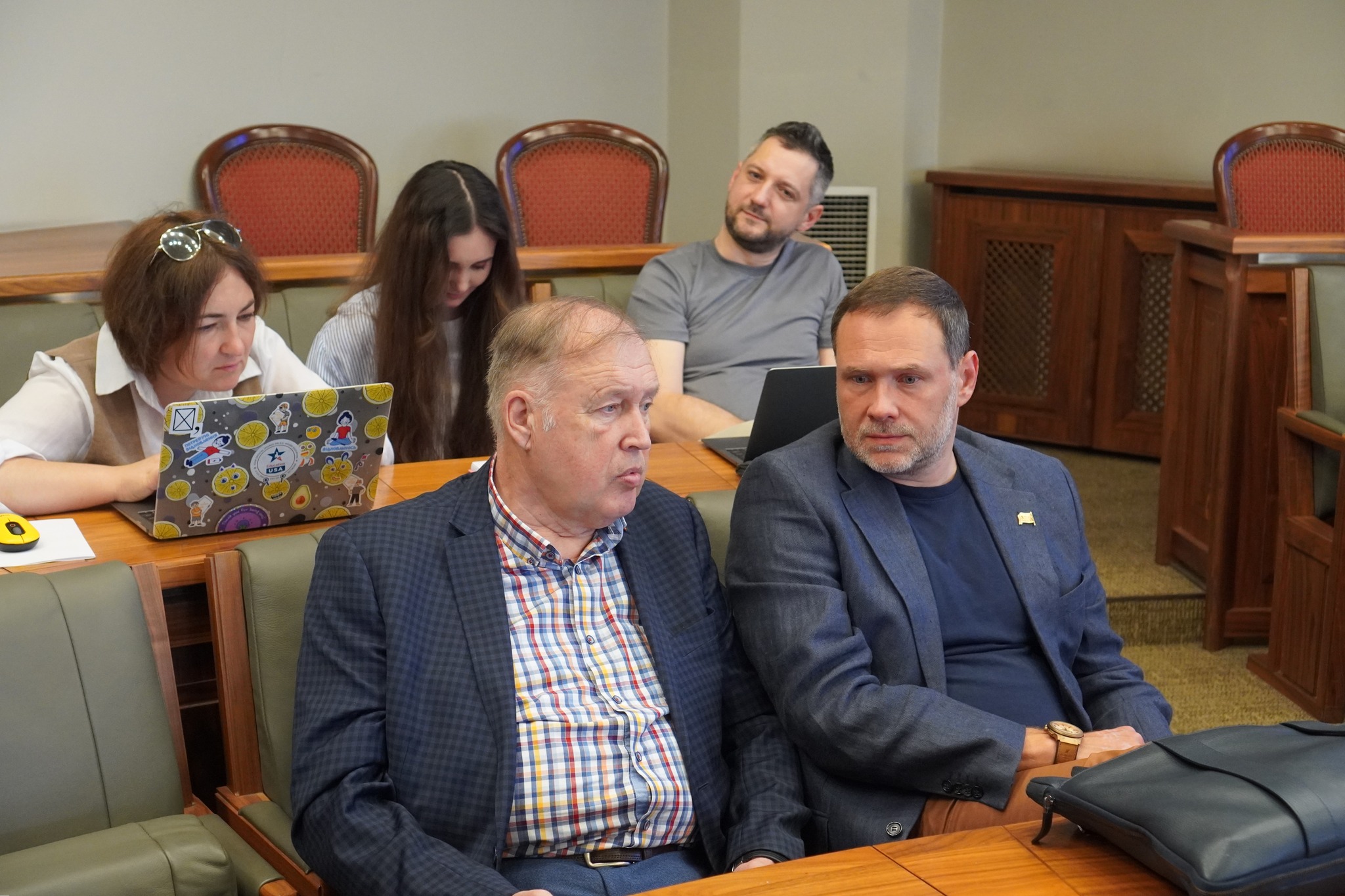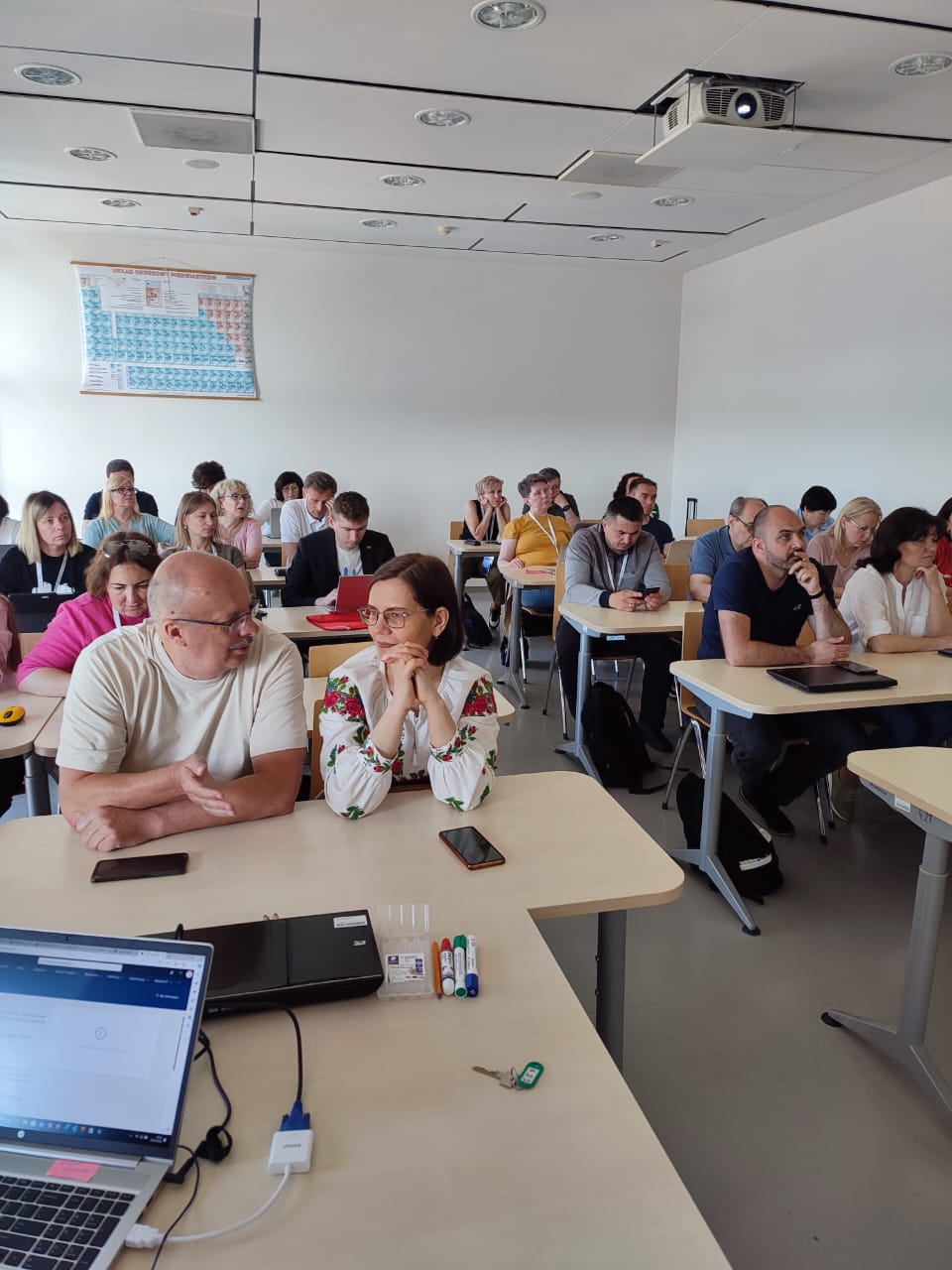The second training/workshop of the DigiUni project took place in Poland
01/06/2024

The second training/workshop of the DigiUni project took place in Poland
From May 27 to 31, Adam Mickiewicz University in Poznań, Poland, hosted the second
training/workshop “Enhancing Digital Competencies.” This event is part of the EU Erasmus+
Program project, “Digital University - Open Ukrainian Initiative” – DigiUni ( DigiUni: Digital
University — Open Ukrainian Initiative ). Participants included representatives from 10 Ukrainian
partner universities of the project, the Ministry of Education and Science of Ukraine, and the
Ukrainian Association of IT Professionals.
At the start of the workweek, Professor Rafał Witkowski, Vice-Rector of Adam Mickiewicz
University, welcomed the participants with introductory remarks.
The initial phase of the training focused extensively on exploring the EPICUR consortium's
experience in creating a platform for digitizing student mobility among member universities and
implementing hybrid learning.
«Each Ukrainian university partner of the DigiUni project brings its unique experience, which it
shares during the training. The composition of partners is not random. During the training at Adam
Mickiewicz University, we were presented with the practices of the host institution. Additionally,
since the Polish university is a member of the EPICUR university alliance, it was crucial to observe how universities, that are positively competitive, find common ground, satisfy students, and mutually strengthen and develop, creating synergy. Ultimately, all this contributes to the alliance's success and reputation growth. This holds significant importance for us since within DigiUni, we are actively establishing the foundation for an alliance of Ukrainian universities learning to collaborate in shaping a unified digital educational space using a common digital education platform», noted Sergiy Bronin, DigiUni project coordinator from Taras Shevchenko National University of Kyiv.
since the Polish university is a member of the EPICUR university alliance, it was crucial to observe how universities, that are positively competitive, find common ground, satisfy students, and mutually strengthen and develop, creating synergy. Ultimately, all this contributes to the alliance's success and reputation growth. This holds significant importance for us since within DigiUni, we are actively establishing the foundation for an alliance of Ukrainian universities learning to collaborate in shaping a unified digital educational space using a common digital education platform», noted Sergiy Bronin, DigiUni project coordinator from Taras Shevchenko National University of Kyiv.
Yevgen Sokol, Rector of the National Technical University "Kharkiv Polytechnic Institute,"believes:
"The training was beneficial as we learned about various approaches used to address
similar issues that our DigiUni project faces. It's interesting that the problems discussed by
EPICUR alliance representatives coincide with those we discussed during the implementation of
our DigiUni project. The alliance consists of 9 European educational institutions, while we have
more partners, including both Ukrainian and foreign universities. There are many nuances to
consider for effective communication and collaboration.
I am confident that the upcoming trainings will provide us with a better understanding of how to accomplish our main goal - creating a digital educational platform and filling it with content. Our university has been using one of the most innovative digital platforms for several years, which continues to evolve actively, accumulating unique experience within the Ukrainian higher education system, and which we propose as the foundation. Discussions are ongoing."
I am confident that the upcoming trainings will provide us with a better understanding of how to accomplish our main goal - creating a digital educational platform and filling it with content. Our university has been using one of the most innovative digital platforms for several years, which continues to evolve actively, accumulating unique experience within the Ukrainian higher education system, and which we propose as the foundation. Discussions are ongoing."
A separate day was devoted to using Microsoft Forms as a tool for creating forms, tests, and
surveys for educational purposes. Participants learned how to use MS Teams to organize and
conduct effective online meetings, maximizing available options for seamless collaboration.
Yuliia Serhieieva, Head of the Projects and Educational Programs Department of the Center for
Educational and Innovative Technologies of the Ukrainian Catholic University mentions the
lectures dedicated to Microsoft Forms and Microsoft Teams with interest:
"At our university, there is no single policy regarding the use of a specific operating system or
application in the educational process. Everyone chooses what is convenient for them. Therefore, it
was interesting for me to learn about the capabilities of these applications."
Yuliia's colleague, Petro Baykovskyy, an Associate Professor of the Department of Political Science
of the Ukrainian Catholic University, believes that "this training primarily improves digital skills,
and systematizes knowledge of various platforms and capabilities. Currently, partner universities
participating in the DigiUni project are exploring different platform options to reach a consensus
on what our platform should be, where online courses for Ukrainian students will be published."
Ms. Yulia's colleague, Petro Baikovskyi, a lecturer at the Department of Political Sciences of the Ukrainian Catholic University, believes that "this training primarily allows you to improve digital skills, systematize knowledge about various platforms and opportunities.
According to Sergiy Bronin, this part of the training was filled with information that can be used in
developing content for the DigiUni project.
"For some participants, working with Microsoft Forms and Microsoft Teams represented a new
experience. It's beneficial that we've now all become acquainted with their functionalities, as our
system plans to implement a communication system using Microsoft Teams. Microsoft Forms proves
to be an excellent tool for content development," noted the DigiUni project coordinator from Taras
Shevchenko National University of Kyiv.
Participants also studied the experience of creating video content in online education, learned best
practices for creating engaging and effective educational videos, and the basics of professional
video production. All this knowledge is necessary for creating high-quality educational content.
Those interested had the opportunity to practice recording videos and perform speech exercises in a
professional studio during the workshop.
Participants also gained insights into the Collaborative Online International Learning (COIL)
project, an example of "virtual mobility" that allows students from different countries and
universities to interact with colleagues and professionals to develop intercultural competencies and
digital skills during joint educational tasks or activities related to specific subjects.
Vitaliy Nosok, State Expert on Higher and Adult Education, Directorate of Professional Pre-higher
and Higher Education of the Ministry of Education and Science of Ukraine noted:
"The DigiUni project is a unique structural project of the Erasmus+ program. From the Ministry's
perspective, supporting the institutional capacity of Ukrainian higher education institutions in
creating a digital platform and filling it with content is very important. The state does not always
have the resources to support higher education institutions in implementing high-tech solutions, so
international support and experience are valuable to all. The Ministry is a full partner in the project
and is ready to provide necessary assistance, including making changes to the regulatory
framework and higher education standards in terms of educational program content. The training
was very interesting as it included practical aspects and tools. We were also presented with the
experience of organizing platforms implemented at Adam Mickiewicz University, which
collaborates with universities in other countries and already utilizes the best practices related to
synchronizing processes that occur in different universities. Polish colleagues sincerely share this
experience because they understand our goal - to create a truly high-quality and universal national
learning platform that can be used not only by partner universities but by anyone interested, as the
project is public."
Larysa Chovnyuk, Head of the International Office of the National University of Kyiv-Mohyla
Academy, noted:
"The DigiUni project is highly ambitious, and like all ambitious initiatives, it requires time and
human interaction for consensus to be reached on our objectives. These collaborative meetings with
partners are crucial. We observe developments in other universities, engage in discussions among
ourselves, and undoubtedly, we will establish a framework that meets our specific needs and
ensures sustainability beyond the project's conclusion."
Tomasz Brańka, a member of the DigiUni organizational committee, discussed the philosophy
embedded in the DigiUni project:
"Several years ago, we began to create a consortium of our universities, a platform for exchanging
ideas, courses, and perhaps knowledge and experience. When we started working, we saw that this
could be beneficial. Similar processes are taking place in your Ukrainian consortium, which you
are creating within the project.
Collectively, we are developing a platform that will benefit not just the universities involved in this project, but also all Ukrainian universities. The pandemic and the ongoing war have shown us the importance of having a strong digital foundation for our development. Even after the war, we understand that this will be our new reality; there will be no return to the times before the pandemic. If I had to describe this new situation in one word, it would be 'flexibility.' We must be much more flexible. Students have also seen that some knowledge can be taught using internet resources, using platforms and that it is not always necessary to meet in person in the classroom. Undoubtedly, face-to-face communication between teacher and student is important, but we can adapt. After the pandemic, it has also become clear that students can take on more responsibility. Interaction between teacher and student can develop, and we can give students more responsibility."
Collectively, we are developing a platform that will benefit not just the universities involved in this project, but also all Ukrainian universities. The pandemic and the ongoing war have shown us the importance of having a strong digital foundation for our development. Even after the war, we understand that this will be our new reality; there will be no return to the times before the pandemic. If I had to describe this new situation in one word, it would be 'flexibility.' We must be much more flexible. Students have also seen that some knowledge can be taught using internet resources, using platforms and that it is not always necessary to meet in person in the classroom. Undoubtedly, face-to-face communication between teacher and student is important, but we can adapt. After the pandemic, it has also become clear that students can take on more responsibility. Interaction between teacher and student can develop, and we can give students more responsibility."
Ukrainian partners sincerely thank the Adam Mickiewicz University in Poznan team for organizing
the training and supporting the group during the educational visit.






Other News
Do you want to always be up to date with the news?
Subscribe to receive emails.
Thank you! Your submission has been received!
Oops! Something went wrong while submitting the form.